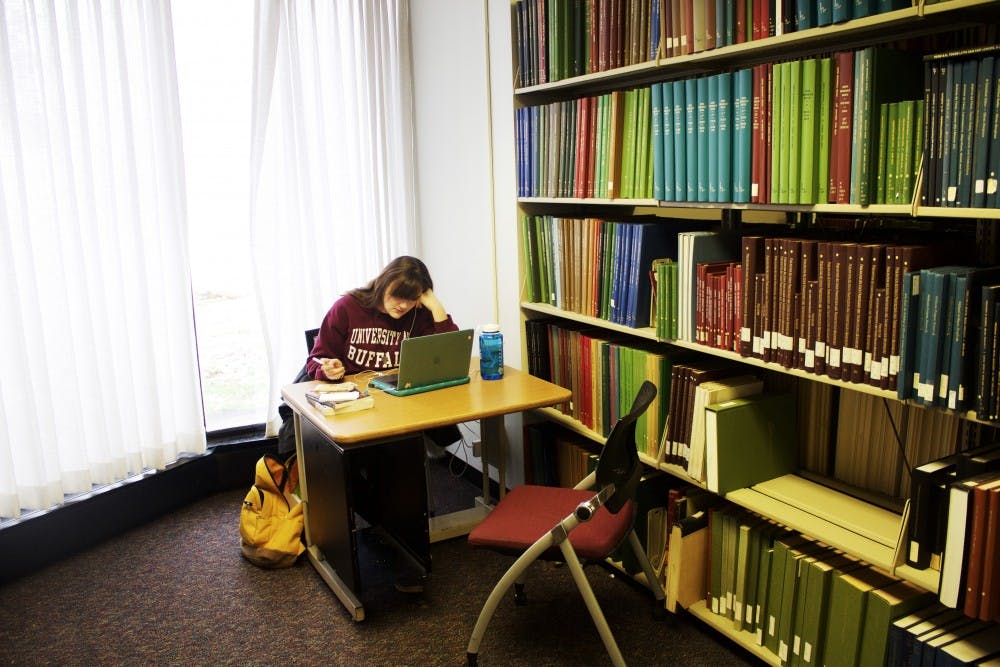James Currie is worried about the future of UB’s Music Library.
Since he came to UB 15 years ago, he said, he has seen dramatic changes to the library.
Back then, Currie, a musicology professor, said the library had three staff members and a circulation expert.
Now, the staff is down to one librarian.
Currie isn’t the only person who wants a clear answer about the library’s status, he and others in the music department told The Spectrum. The 51-year-old collection –– comprising some material that can only be found at UB –– holds 224,000 scores, LPs and more in Baird Hall, and UB Libraries has recently been tracking how many people use it. Faculty members say the library’s resources are dwindling and believe the historic collection has seen better days.
Interim Vice Provost for University Libraries Elizabeth Adelman declined to comment on UB Libraries’ specific plans for the Music Library space. But Adelman, in an email, wrote that UB Libraries has discussed possible changes to library operations with the music department.
“There’s no official statement on the intended objective for the Music Library and yet, resources have repeatedly been withdrawn,” Currie said. “It’s kept the library on hold and kept [the department] from being able to properly respond and defend the Music Library.”
Currie is the chair of the Music Library Committee, which acts as a negotiator between the music department and the Music Library. He said issues with the Music Library began before this year, as UB Libraries began to “whittle away” at staffing.
Currie said UB Libraries is “perfectly aware” that the music department has concerns over the library.
“They’re aware that we have grave misgivings about their practice, and what they have decided and not decided to inform us about regarding the Music Library,” Currie said. “We’ve had this out in meetings before, quite fractured meetings between us and the faculty, in general, and the upper-level library administration.”
John Bewley, music librarian and archivist, declined to comment for this story.
Staffing changes are common and “reflect what is going on libraries-wide,” according to Adelman. She wrote in an email that UB Libraries has launched a “master planning process” for looking at future library needs for the university.
The planning process is ongoing and a “series of options are under consideration for reimagining physical library spaces,” according to Adelman. Adelman wrote that it would be premature to discuss “anything specific at this time” about the future of UB library spaces.
“We do know that the plan will focus on ensuring that our students have the best environment for learning, and that includes continuing to provide access to the Music Library’s collection,” Adelman wrote.
Although Adelman did not confirm any plans for the Music Library space, UB Libraries has made unique efforts to track Music Library activity.
The Spectrum found two data sets pertaining specifically to the Music Library on UB Libraries’ Tableau data statistics page. The Music Library data covers two to four years worth of library circulations and entrance/exit gate counts.
The data, titled “forCAS” and described as being for a “CAS master space plan,” is the only public data for one specific library at UB. “CAS” is a commonly used abbreviation for the College of Arts and Sciences. Robin Schulze, the dean of the college, declined to say whether CAS had any specific plans for the Music Library.
The Spectrum found that library gate counts may not reflect accurate library activity. Any student or member of the public can manually enter library gate counts on the UB website and the gate count is sent to UB Libraries officials. The Spectrum decided not to publish library gate count statistics because they can be manually entered by anyone in the public.
Currie said there are two ways to enter the Music Library, one of which has a gate that tracks how many people enter and exit. The other way does not have a gate that tracks entries and exits. He said he brought this up to UB Libraries administrators, but they’ve ignored the problem.
“The problem is when we get into broader questions on what constitutes relevance,” Currie said. “Is it when there are 1 billion people in the room or is it something else? That’s almost impossible to argue about.”
Jonathan Golove, chair of the music department, said the library is important for the department’s performance majors to access print material in the collection. He said these materials, such as the library’s range of Beethoven sonatas, can add to a performer’s technical competence and interpretation. He said some of the library’s value isn’t captured by gate counts or circulation statistics.
“We just had a researcher from France come and spend two weeks in the library. He was looking at materials that are only here,” Golove said. “So he didn’t check out a single book in two weeks because he was looking at archival materials that aren’t circulating. So there’s a lot of ways to look at it.”
In terms of the future of the Music Library, Golove said it’d be a huge disadvantage for the department to not have it in Baird Hall. He said UB has developed the library in a unique and reputable way.
“The library can’t be the Library of Congress, it can’t be a repository of every scrap of everything that’s printed but, at the same time, it’s been a destination for scholars as well as an asset that’s oriented in the way that our [department] is, which is for modern classical music,” Golove said.
“The longer you allow that to be rudderless, the more it becomes a time capsule, because then there’s a gap in caring for that vision that you can’t really fill in. You’ll never be able to fill in for the time period that you decided to suspend that. It may be a very beautiful time capsule, it may be interesting, but it’s not the same as a living archive.”
Adelman wrote that UB Libraries has discussed with the music department a possible transition from print to electronic subscriptions in the Music Library. She wrote that they discussed not having the Music Library open during winter break due to “reduced usage of the library during this time period,” but UB Libraries has decided to keep it open for limited hours over break.
Adelman wrote that UB Libraries remains “committed to support faculty and students from the Music Department,” but after UB Libraries’ planning process “is complete,” she can comment further.
Nick Emmanuel, a Ph.D. candidate in historical musicology, said the Music Library is the most valuable resource for his research at UB. Emmanuel said the Music Library’s circulation is an “incredibly limited” datapoint in terms of its value.
“Most of the resources I consult for research are resources I don’t wind up checking out; there’s no need to because I don’t want 600 books in my apartment,” Emmanuel said. “Many of the scores I consult are orchestral works, with sometimes 90 parts, and they might be three feet tall. They don’t fit in my backpack or any bag I could carry, so as a rule I won’t check those out.”
Alex Huddleston, a Ph.D. candidate in music composition, said he uses the Music Library more often during the winter and summer. Huddleston, who has an office on the second floor of Baird Hall, said the library’s location is an advantage.
“I think it’s so reasonable to have a Music Library to be in the music department’s building –– it’d be weird to do anything other than that,” Huddleston said.
“Music materials are really different. There’s a whole different history for [a] cataloging system that’s different from literature. My question for the university administration would be, ‘Why this library?’ if they plan to close it, and, ‘What else would you put there?’”
Currie said if UB Libraries were to end the maintenance of the Music Library, it poses the question, “What do we think a university is?”
“If we think a university is just STEM with a little bit of liberal arts stuff on the side, then that’s fine, it should go. But if there’s anything else to a university, then a place like the Music Library has to be considered,” Currie said.
“I think it’s a great resource for the university and one — with minimal thought — the administration could use to their advantage for selling the university and for increasing student enrollment on all sorts of levels. To take away these things and just have STEM and technology is so short-sighted historically, it is extraordinary to me. It is writing the university out of existence.”
Benjamin Blanchet is the senior features editor and can be reached benjamin.blanchet@ubspectrum.com and on Twitter @BenjaminUBSpec.

Benjamin Blanchet is the senior engagement editor for The Spectrum. His words have been seen in The Buffalo News (Gusto) and The Sun newspapers of Western New York. Loves cryptoquip and double-doubles.





